As federal student loan payments resume in the post-pandemic era, the Better Business Bureau (BBB) in Georgia has published a formal statement about an increase in student-loan scams aimed at borrowers. The re-start of the payments has spawned confusion on millions of Americans which the scammers are capitalizing on. After having done further research, the BBB has found that there exist deceptive offers of fast loan forgiveness, debt relief, and loan consolidation trickling in through phone calls, emails and even social media.
Scammers Exploit Borrower Confusion
Fraudsters are calling up borrowers as though they are officials from the U.S. Department of Education or real loan servicers. The scammers are liable to state that the borrower is eligible to loan forgiveness programs or special payment plans, but only if they make an instant decision and pay in advance. The messages tend to have official-looking logos, use legal terms and employ a sense of urgency to shame victims. In most cases, they will request Social Security numbers, bank account details or even log-in information to the borrower’s federal student aid (FSA) account. With access granted, scammers will be able to change the borrower’s contact details, making it difficult to track the fraud until it is too late.
Also read: Donald Trump’s Approval Ratings Fall Amid Immigration Backlash
Common Scam Tactics
The BBB and Federal Trade Commission (FTC) has seen a number of common tricks used by con artists. Among others are the following: charging fees for services that are available free of charge from the government, offering promises of “immediate” or “guaranteed” forgiveness and announcing limited enrollment periods for certain programs. There are scams in which debtors receive an automated call or a text message informing them that their loans are “flagged” or legal proceedings are about to take place. Others come in with proposals to enroll victims into such-sounding and bogus programs allegedly based on existing relief work such as Public Service Loan Forgiveness (PSLF) or Income-Driven Repayment (IDR) plans.
Georgia-Specific Alerts and Efforts
The Georgia BBB notes a significant increase in the number of complaints by consumers in the last quarter concerning student loan scams. This led to the agency issuing a state-wide alert order which asked the residents to be keen and report any suspicious communication. BBB officials in Georgia are also collaborating with local universities and offices providing financial aid for consumers and protecting consumers to disseminate information and support for student borrowers. The effort is to protect from identity theft and monetary loss especially within the vulnerable populations – recent graduates and first-time borrowers.
How Borrowers Can Protect Themselves
The consumer protection agencies advise borrowers to adhere to several easy rules to protect their personal and financial information. First, they should never make advance payments for assistance in their student loans. Unquestionable federal programs do not necessitate any payments to join or enroll. Borrowers should also beware of unsolicited contact that portrays itself to be from the government and never trust people or businesses that make such contacts. The most secure form of managing loans involves logging in directly into studentaid.gov, borrowers here are able to obtain reliable information regarding repayment plans, forgiveness programs, and account balances among many other details.
Also read: Student Loan Delinquencies Surge After Repayment Resumes in 2025
The Perfect Storm for Scams
The present wave of scams occurs in a period of increased uncertainty. Borrowers are confused on where their account stands after almost 3years of suspended payments as a result of the covid-19. Muddling the confusion is the constant political discourse on federal forgiveness plans, some of which even collapsed or delayed because of the court. These have led to what BBB refers to as “perfect storm” for fraud characterized by rampant mis-information and borrowers eager for solutions.








